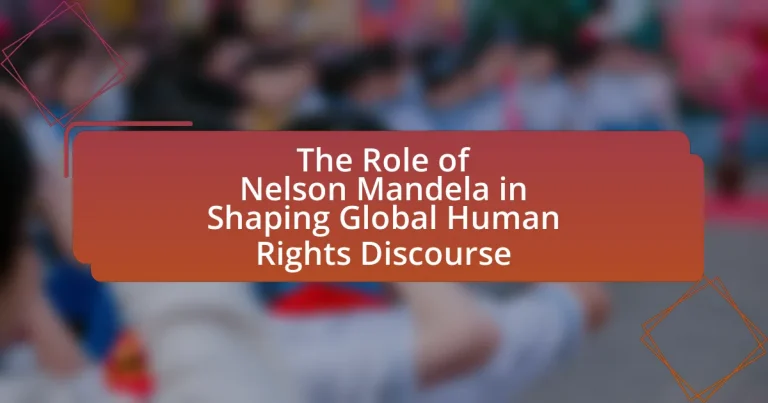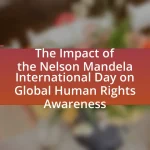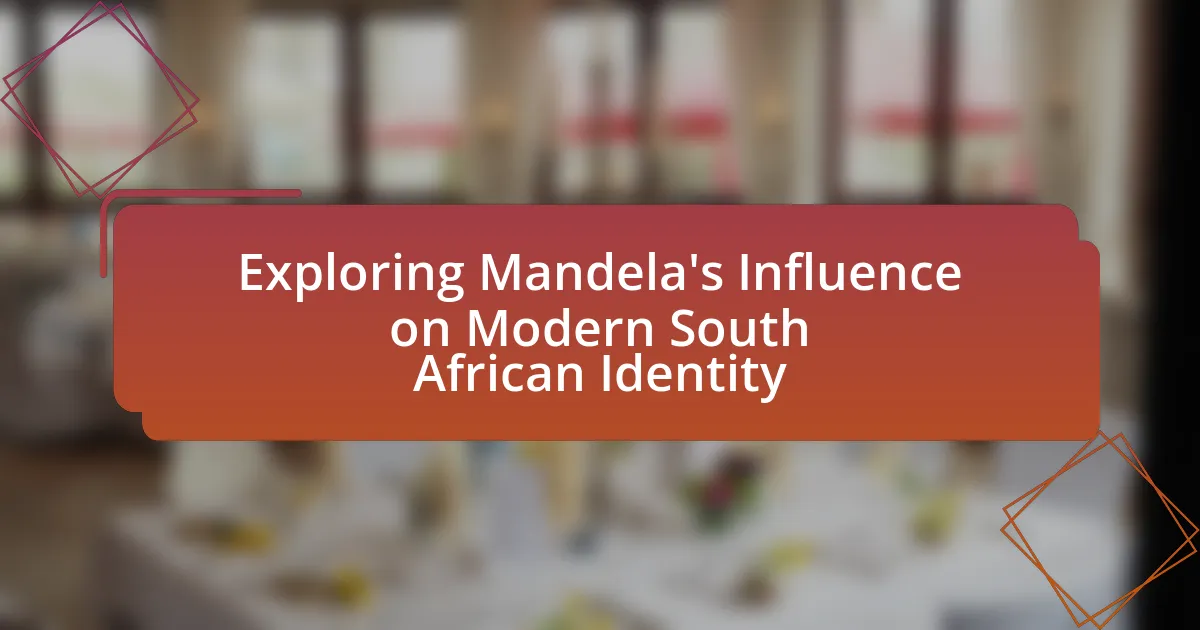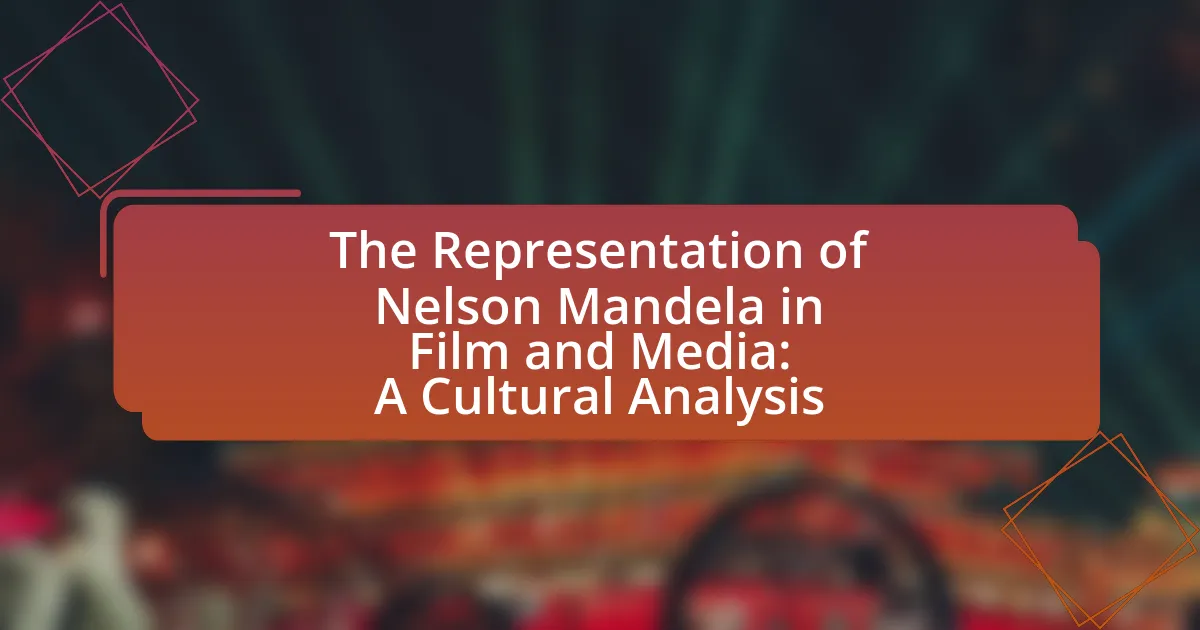Nelson Mandela played a crucial role in shaping global human rights discourse through his advocacy for equality, justice, and the dismantling of apartheid in South Africa. His early experiences with racial discrimination and his education significantly influenced his commitment to human rights, while his leadership in the anti-apartheid movement and subsequent presidency established a framework for equality and justice in South Africa. Mandela’s emphasis on reconciliation and dialogue not only transformed national policies but also inspired international human rights initiatives, reinforcing the importance of human dignity. His legacy continues to influence global human rights frameworks and movements, highlighting the interconnectedness of social justice issues worldwide.
What was Nelson Mandela’s impact on global human rights discourse?
Nelson Mandela significantly advanced global human rights discourse by advocating for equality, justice, and the dismantling of apartheid in South Africa. His leadership in the anti-apartheid movement highlighted the importance of human rights as a universal principle, influencing international norms and policies. Mandela’s release from prison in 1990 and subsequent presidency symbolized a triumph over oppression, inspiring global movements for civil rights and social justice. His emphasis on reconciliation and forgiveness set a precedent for conflict resolution and human rights advocacy worldwide, reinforcing the idea that human dignity is paramount.
How did Mandela’s early life influence his views on human rights?
Nelson Mandela’s early life significantly shaped his views on human rights through his experiences with racial discrimination and his upbringing in a tribal society. Growing up in the rural village of Mvezo, Mandela witnessed the injustices faced by his community under colonial rule, which instilled in him a deep understanding of the importance of equality and justice. His education at the University of Fort Hare, where he encountered political activism and discussions on social justice, further solidified his commitment to human rights. Additionally, Mandela’s involvement in the African National Congress (ANC) during his youth exposed him to the broader struggle against apartheid, reinforcing his belief that all individuals deserve dignity and freedom. These formative experiences laid the groundwork for his lifelong dedication to fighting for human rights and equality on a global scale.
What experiences shaped Mandela’s understanding of justice and equality?
Nelson Mandela’s understanding of justice and equality was profoundly shaped by his experiences of racial discrimination, imprisonment, and his involvement in the anti-apartheid movement. Growing up in a racially segregated South Africa, Mandela witnessed firsthand the injustices faced by black South Africans, which fueled his commitment to fighting for equality. His 27 years of imprisonment, particularly on Robben Island, deepened his resolve and understanding of systemic oppression, as he engaged in discussions with fellow inmates about justice and human rights. Additionally, Mandela’s leadership in the African National Congress and participation in negotiations to end apartheid highlighted the importance of reconciliation and dialogue in achieving justice. These experiences collectively informed his vision of a democratic society where equality and human rights are upheld for all.
How did Mandela’s education contribute to his human rights advocacy?
Mandela’s education significantly contributed to his human rights advocacy by equipping him with critical thinking skills and a deep understanding of law and social justice. His formal education at the University of Fort Hare and later at the University of Witwatersrand exposed him to political ideologies and the injustices faced by black South Africans. This academic background enabled Mandela to articulate the struggles against apartheid effectively and to engage in legal battles, such as those during the Defiance Campaign. His studies in law provided him with the tools to challenge oppressive laws and advocate for equality, ultimately shaping his role as a leader in the African National Congress and a global symbol for human rights.
What role did Mandela play in the anti-apartheid movement?
Nelson Mandela was a pivotal leader in the anti-apartheid movement, advocating for the end of racial segregation and discrimination in South Africa. He co-founded the African National Congress Youth League in 1944, which aimed to mobilize young people against apartheid policies. Mandela’s leadership in the ANC led to his involvement in the Defiance Campaign of 1952, where he promoted nonviolent resistance. His subsequent imprisonment for 27 years became a symbol of the struggle against apartheid, galvanizing international support for the anti-apartheid cause. Mandela’s release in 1990 marked a significant turning point, leading to negotiations that ultimately dismantled apartheid and established a democratic South Africa. His role was instrumental in shaping both national and global human rights discourse, emphasizing equality and justice.
How did Mandela’s imprisonment affect the global perception of apartheid?
Mandela’s imprisonment significantly shifted global perception of apartheid by highlighting the injustices of the South African regime. His long incarceration, lasting 27 years, drew international attention and condemnation towards apartheid, transforming him into a symbol of resistance against racial oppression. The global anti-apartheid movement gained momentum during his imprisonment, leading to widespread protests, economic sanctions, and divestment campaigns against South Africa. For instance, the United Nations General Assembly declared apartheid a crime against humanity in 1973, further solidifying the global stance against the regime. Mandela’s eventual release in 1990 marked a pivotal moment, as it catalyzed negotiations to dismantle apartheid, demonstrating the profound impact of his imprisonment on international awareness and action against racial discrimination.
What strategies did Mandela employ to mobilize international support?
Nelson Mandela employed several key strategies to mobilize international support, including advocacy through global campaigns, leveraging personal charisma, and forming strategic alliances with influential leaders and organizations. He effectively utilized international platforms, such as the United Nations, to highlight the injustices of apartheid, which garnered widespread attention and condemnation. Mandela’s personal story of resilience and sacrifice resonated globally, making him a symbol of the struggle for freedom and human rights. Additionally, he collaborated with anti-apartheid movements worldwide, fostering solidarity and encouraging economic sanctions against the South African government, which ultimately pressured for change. These strategies collectively contributed to a robust international movement that supported the end of apartheid and advanced human rights discourse globally.
How did Mandela’s presidency influence human rights policies in South Africa?
Mandela’s presidency significantly influenced human rights policies in South Africa by establishing a framework for equality and justice that dismantled apartheid-era laws. His government prioritized the creation of the Bill of Rights in the 1996 Constitution, which enshrined fundamental human rights, including equality, freedom of expression, and protection against discrimination. This constitutional commitment was a direct response to the systemic violations experienced under apartheid, and it laid the groundwork for a more inclusive society. Additionally, Mandela’s leadership fostered national reconciliation through the Truth and Reconciliation Commission, which addressed past human rights abuses and promoted healing. These initiatives collectively transformed South Africa’s legal landscape, ensuring that human rights became a cornerstone of governance and societal values.
What key policies did Mandela implement to promote equality?
Nelson Mandela implemented several key policies to promote equality, including the establishment of the Reconstruction and Development Programme (RDP), which aimed to address socio-economic disparities. The RDP focused on providing housing, education, and healthcare to marginalized communities, thereby directly targeting the inequalities entrenched by apartheid. Additionally, Mandela’s government enacted the Promotion of Equality and Prevention of Unfair Discrimination Act in 2000, which sought to eliminate discrimination and promote equal rights for all citizens. These policies were foundational in dismantling systemic inequalities and fostering a more equitable society in post-apartheid South Africa.
How did Mandela address issues of reconciliation and justice?
Nelson Mandela addressed issues of reconciliation and justice primarily through the establishment of the Truth and Reconciliation Commission (TRC) in 1995. The TRC aimed to uncover the truth about human rights violations that occurred during apartheid, allowing victims to share their experiences while offering perpetrators a chance for amnesty in exchange for full disclosure. This approach emphasized restorative justice over retributive justice, fostering national healing and unity. Mandela’s leadership in promoting dialogue and forgiveness was pivotal in transitioning South Africa from a divided society to a more inclusive democracy, as evidenced by the peaceful transfer of power and the reduction of violence during this critical period.
How did Mandela’s legacy shape international human rights frameworks?
Mandela’s legacy significantly shaped international human rights frameworks by promoting the principles of equality, justice, and reconciliation. His leadership in the anti-apartheid movement highlighted the importance of human dignity and the need for systemic change, influencing global human rights policies. The establishment of the Nelson Mandela Foundation and the adoption of the Nelson Mandela Rules by the United Nations in 2015, which set standards for the treatment of prisoners, serve as concrete examples of how his ideals have been integrated into international human rights norms. Mandela’s emphasis on dialogue and forgiveness has also inspired various human rights initiatives aimed at conflict resolution and social justice worldwide.
What global human rights initiatives were inspired by Mandela’s work?
Nelson Mandela’s work inspired several global human rights initiatives, including the establishment of the Nelson Mandela Foundation, which promotes social justice and human rights. Additionally, the United Nations declared July 18 as Nelson Mandela International Day to honor his contributions to peace and freedom. Mandela’s advocacy against apartheid also influenced the creation of the African Charter on Human and Peoples’ Rights, which emphasizes the importance of human rights across the continent. His legacy continues to inspire movements for equality and justice worldwide, reinforcing the universal principles of human dignity and respect.
How did Mandela’s principles influence the United Nations’ human rights agenda?
Mandela’s principles significantly influenced the United Nations’ human rights agenda by promoting values of equality, justice, and reconciliation. His advocacy for human rights, particularly during his presidency and through his global activism, led to the incorporation of these values into UN policies and initiatives. For instance, Mandela’s emphasis on the importance of dignity for all individuals contributed to the establishment of the UN’s Universal Declaration of Human Rights as a foundational document. Additionally, his efforts in addressing systemic racism and advocating for the rights of marginalized communities inspired the UN’s focus on anti-discrimination measures and the promotion of social justice worldwide.
What role did Mandela play in the establishment of the African Union’s human rights policies?
Nelson Mandela played a pivotal role in the establishment of the African Union’s human rights policies by advocating for a framework that emphasized human dignity, equality, and justice across the continent. His leadership in the anti-apartheid movement and subsequent presidency in South Africa set a precedent for prioritizing human rights in African governance. Mandela’s influence is evident in the African Charter on Human and Peoples’ Rights, which aligns with his vision of promoting social justice and protecting individual rights. His commitment to reconciliation and dialogue fostered an environment conducive to the development of robust human rights policies within the African Union, reinforcing the importance of these principles in post-colonial Africa.
How did Mandela’s speeches and writings contribute to human rights discourse?
Nelson Mandela’s speeches and writings significantly advanced human rights discourse by articulating the principles of equality, justice, and freedom. His 1964 speech during the Rivonia Trial emphasized the struggle against apartheid and the universal right to dignity, which resonated globally and inspired movements for justice. Additionally, Mandela’s autobiography, “Long Walk to Freedom,” detailed his experiences and the broader fight against oppression, providing a personal narrative that highlighted the importance of human rights. These contributions not only raised awareness about systemic injustices in South Africa but also influenced international human rights frameworks, as evidenced by the adoption of the Universal Declaration of Human Rights principles in various global contexts.
What themes are prevalent in Mandela’s speeches regarding human rights?
Nelson Mandela’s speeches regarding human rights predominantly emphasize themes of equality, justice, and freedom. He consistently advocated for the inherent dignity of all individuals, highlighting the importance of dismantling apartheid and promoting racial harmony. For instance, in his 1994 inaugural address, Mandela stated, “We understand it still that there is no easy walk to freedom,” underscoring the struggle for liberation and the necessity of perseverance in the fight against oppression. Additionally, Mandela’s speeches often called for global solidarity in human rights efforts, reflecting his belief that the fight for justice transcends national boundaries. His commitment to reconciliation and forgiveness, as seen in his emphasis on unity in the post-apartheid era, further illustrates his vision of a just society where human rights are universally respected.
How have Mandela’s writings been utilized in human rights education?
Mandela’s writings have been utilized in human rights education to promote principles of equality, justice, and dignity. His autobiography, “Long Walk to Freedom,” serves as a foundational text that illustrates the struggle against apartheid and emphasizes the importance of human rights. Educational institutions incorporate his writings into curricula to inspire activism and critical thinking about social justice issues. For instance, the Nelson Mandela Foundation provides resources and programs that leverage his words to educate young people about their rights and responsibilities, fostering a culture of respect and understanding.

What challenges did Mandela face in promoting human rights globally?
Nelson Mandela faced significant challenges in promoting human rights globally, primarily due to entrenched political systems and resistance from powerful nations. His efforts were often met with skepticism from governments that prioritized national interests over human rights, as seen during the Cold War when many countries supported apartheid South Africa for strategic reasons. Additionally, Mandela encountered obstacles in mobilizing international support, as some nations were reluctant to impose sanctions or take a stand against apartheid due to economic ties. The complexity of global geopolitics further complicated his mission, as he sought to align diverse international actors with a unified human rights agenda.
What opposition did Mandela encounter from various political entities?
Nelson Mandela encountered significant opposition from various political entities, primarily the apartheid government of South Africa, which enforced racial segregation and discrimination. This regime viewed Mandela and the African National Congress (ANC) as threats to its authority, leading to his arrest in 1962 and subsequent life sentence in 1964 for sabotage and conspiracy to overthrow the government. Additionally, Mandela faced opposition from some international entities that were hesitant to impose sanctions on South Africa, fearing economic repercussions. The United States, for example, initially classified the ANC as a terrorist organization, complicating international support for Mandela’s cause. These political challenges underscored the complexities of Mandela’s struggle for equality and human rights, as he navigated both domestic repression and international indifference.
How did global political dynamics affect Mandela’s human rights efforts?
Global political dynamics significantly influenced Nelson Mandela’s human rights efforts by providing both support and challenges during his activism. The Cold War context, for instance, shaped international perceptions of apartheid; many countries aligned with anti-colonial movements supported Mandela’s cause, viewing it as part of a broader struggle against imperialism. Additionally, the global anti-apartheid movement gained momentum in the 1980s, with economic sanctions and divestment campaigns from Western nations applying pressure on the South African government. This international solidarity was crucial in amplifying Mandela’s message and ultimately contributed to the dismantling of apartheid, as evidenced by the 1990 release of Mandela following years of global advocacy.
What criticisms did Mandela face regarding his approach to human rights?
Nelson Mandela faced criticisms for his approach to human rights, particularly regarding his perceived compromises with the South African government during the transition from apartheid. Critics argued that Mandela’s willingness to negotiate with former oppressors, including the African National Congress’s acceptance of the Truth and Reconciliation Commission’s amnesty provisions, undermined justice for victims of apartheid. Additionally, some human rights advocates contended that Mandela’s focus on reconciliation sometimes overshadowed the need for accountability and reparations for those who suffered under the regime. These criticisms highlight the tension between achieving political stability and ensuring comprehensive justice in post-apartheid South Africa.
How did Mandela address the complexities of human rights in a post-apartheid context?
Nelson Mandela addressed the complexities of human rights in a post-apartheid context by promoting reconciliation and establishing a framework for equality and justice. He recognized the need for a Truth and Reconciliation Commission, which aimed to uncover human rights abuses during apartheid, allowing victims to share their experiences and perpetrators to confess their crimes, fostering healing and unity. Mandela’s leadership emphasized the importance of inclusivity in the new South Africa, advocating for the protection of all citizens’ rights regardless of race, gender, or background, as reflected in the 1996 Constitution, which enshrined a comprehensive Bill of Rights. His commitment to human rights was further demonstrated through international advocacy, where he highlighted the interconnectedness of global human rights issues, thereby influencing global discourse on human rights.
What were the key challenges in uniting diverse groups under a common human rights agenda?
The key challenges in uniting diverse groups under a common human rights agenda included differing cultural values, conflicting political interests, and varying levels of commitment to human rights principles. These challenges arose because groups often prioritized their specific issues, such as racial equality, gender rights, or economic justice, leading to fragmentation. For instance, during the 1993 World Conference on Human Rights in Vienna, representatives from various countries struggled to agree on a universal definition of human rights due to these differing priorities and perspectives. Additionally, historical grievances and power dynamics often hindered collaboration, as seen in the tensions between developed and developing nations regarding human rights obligations.
How did Mandela’s approach evolve in response to emerging global human rights issues?
Nelson Mandela’s approach evolved significantly in response to emerging global human rights issues by transitioning from a focus on anti-apartheid activism to advocating for broader human rights and social justice on an international scale. Initially, Mandela concentrated on dismantling apartheid in South Africa, but after his release in 1990, he recognized the interconnectedness of global human rights struggles. This shift was evident during his presidency from 1994 to 1999, where he emphasized reconciliation and nation-building while also addressing issues such as poverty, inequality, and HIV/AIDS, which he framed as global human rights concerns. Mandela’s participation in international forums, such as the United Nations, further demonstrated his commitment to promoting human rights worldwide, advocating for the rights of marginalized groups and emphasizing the importance of global solidarity in addressing human rights violations.
What lessons can be learned from Mandela’s approach to human rights advocacy?
Nelson Mandela’s approach to human rights advocacy teaches the importance of resilience, reconciliation, and the power of dialogue. His commitment to non-violence, even after 27 years of imprisonment, exemplifies resilience in the face of oppression. Mandela emphasized reconciliation over retribution, as seen in his efforts to unite a divided South Africa post-apartheid, which fostered national healing and stability. Furthermore, his belief in dialogue as a means to resolve conflicts is evident in his negotiations with the apartheid government, demonstrating that constructive communication can lead to meaningful change. These lessons underscore the effectiveness of patience, understanding, and collaboration in the pursuit of human rights.
How can Mandela’s strategies be applied to current human rights movements?
Mandela’s strategies can be applied to current human rights movements by emphasizing reconciliation, dialogue, and grassroots mobilization. His approach to dismantling apartheid involved fostering understanding between opposing groups, which can guide contemporary movements in addressing systemic injustices through inclusive conversations. For instance, Mandela’s establishment of the Truth and Reconciliation Commission in South Africa serves as a model for current movements seeking to heal societal divisions and promote restorative justice. Additionally, Mandela’s ability to mobilize diverse communities around a common cause illustrates the importance of coalition-building in today’s human rights efforts, as seen in movements like Black Lives Matter, which unites various groups to combat racial injustice.
What best practices can be derived from Mandela’s legacy in human rights discourse?
Best practices derived from Mandela’s legacy in human rights discourse include the promotion of reconciliation, the importance of dialogue, and the commitment to equality and justice. Mandela emphasized reconciliation over retribution, as seen in his leadership during South Africa’s transition from apartheid, which fostered national unity and healing. His advocacy for dialogue highlighted the necessity of engaging diverse perspectives to address human rights issues effectively. Furthermore, Mandela’s unwavering commitment to equality and justice serves as a model for advocating against discrimination and for the protection of marginalized groups, reinforcing the idea that human rights are universal and indivisible. These practices are validated by Mandela’s successful efforts in dismantling apartheid and establishing a democratic society that respects human rights for all citizens.




